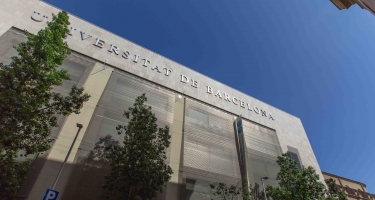About CCiL Master
Pre-enrollment is now closed. A new period will open around March—stay tuned!

Our MA is a research-oriented program that focuses on the relationship between the different disciplines of Cognitive Science and Language. Specifically, on perception and language acquisition, the syntactic and semantic processing of speech, the relation between semantics and cognition, the logical structure of language and the epistemological and conceptual foundations of its study and the computational analysis of language. It has three tracks: Philosophy, Linguistics and Psychology.
We welcome students with a degree in Psychology, Philosophy or Linguistics. Students holding a degree in Translation, Philologies (with linguistic banckground), Speech Therapy and Cognitive Sciences are also accepted and will be required to enrol in background courses depending on their transcripts.
Duration
1 year (full time), 60 credits ECTS if the student does not need background courses. Students studying part time need to register at least 20ECTS per year, which means completing the studies in 2 or 3 years.
Modality
The CCiL Master is an in-person master, remote possibilities are not offered and class attendance is a requirement for all courses.
Calendar
From September to September. Classes go from September to May/June but MA theses are defended in September. More information and public holidays avaliable in the schedule.
Reference fees
- EU citizens if no background courses are required: 1660.20€ (27.67€ per credit ECTS) + 30,21€ preadmission fee + 218,15 € for the title)
- Non-EU citizens: 82€ per credit ECTS
The fees are fixed by the Government each year, you can check current fees here. And here you have a simulation that will also take into account your personal circumstances and origin. More fee info at Faculty of Philosophy enrolment.
Quality
Our MA is an official program and it has been aproved by the AQU, Catalunya's Agency for the Quality of the Catalan University System, a competence assessment organ appointed by the Spanish government. See the report here.
Languages
Every branch offers enough courses in English so that it is possible to complete the 60 credits of the master's in English; in particular, all mandatory courses, and more than half of the optionals offered, are in English. Other program activities (talks, workshops, conferences…) are mainly in English. The official languages of the program are English, Spanish and Catalan. Background courses are mostly in Catalan and Spanish. The language of each course is announced at the time of registration. You can learn Catalan upon arrival.
How to apply
The pre-enrollment period is now closed. We will open a new period around March. Please ensure you submit your application within this period at the Faculty's official page by clicking "Pre-enrolment". Check out all the required documentation and steps on our Admission page.

To fulfill the requirements of the master, each student must take 60 credits, divided as following:
- 15 credits (3 courses) of common courses.
- 15 credits (3 courses) of mandatory courses of the selected branch.
- 15 credits (3 courses) of optional courses to choose among the optional courses of any branch plus the mandatory courses of the other branches.
- 15 credits of a final research paper (TFM).
- In addition to that the admission committee may require the student to take up to 30 additional credits from background courses, depending on the adequacy of the previous studies of the applicant to the branch. Background courses are not always avaliable in English.
Optionality
The MA has three different branches or tracks: Psychology (Models cognitius de Processament del Llenguatge), Linguistics (Teoria Gramatical i Processament Lingüístic) and Philosophy (Lògica i Filosofía). The student must apply to one of these branches at the pre-admission stage and state the branch clearly at the motivation letter.
(*) These are the recommended courses for each branch but you can choose as optional any MA compulsory or optional course, even if it is not from your branch.
Depending on the courses studied in their BA and the branch in which they want to register, students will be required to take up to 2 background courses (12 credits). For example, Translation students willing to register in the Linguistics branch that did not read Linguistics during their BA, will be required to register some Linguistics background courses. Students holding a BA in Linguistics that want to register Psychology as their branch need to register Psychology background courses. The committee takes into account the student's record, the courses taken and their qualifications to assess whether the student needs to take background courses.
Syllabi are avaliable in the teaching language.
The program follows a tutorial action plan. You will be assigned a tutor at the moment of acceptance. Your tutor will be a professor member of the Coordination Committe of the MA for your branch (see the list of tutors at the "Organization" section). Your tutor is your first person of contact for all academic matters and advice.
Tutors advise students on the optional courses that they should take by recommending the courses better tailored to their interests and background. The online registration process needs tutors to verify students choices assuring that every course registration has been supervised. You should contact your tutor as soon as you decide to register.
You should meet in person/online with your tutor at least once every semester, usually at the beginning and at the end (or, in the second semester, as soon as you start working on your Final Master's Thesis-TFM).
If you have a problem, a request or a complaint, your tutor will be your first contact person. You can also contact the program coordinator. The Faculty of Philosophy has also a virtual mailbox were you can send suggestions, comments and complaints.
Other tutorial action plan activities include the Welcome meeting where you will meet other students and faculty and we will introduce the program and the Annual Workshop, which is usually held towards the end of the academic year and has a section where students can talk about their experience in the program and make suggestions for improvement.
Please remember that the best way to report your level of satisfaction, and make suggestions for improvement, is by filling the survey for each course (you can fill the survey in November/April).
Disability support
Disability support is granted by the Servei d'Atenció a l'Estudiant. If you are a Spanish citizen and have a dissability certificate >33%, you can apply to the ONCE grants.
Gender policy and ethics
Igualtat UB has a protocol for preventing, detecting and taking action on situations of sexual harassment or harassment on the grounds of sex, gender identity or sexual orientation, or any other sexist or anti-LGBTQIA+ conduct [available in English].
- You can submit your complaints to Igualtat UB using this form.
Ethics commission
The Comissió ètica has a code of ethics, integrity and best practices that all professors must follow including non-discrimination (e.g. race or religion), and prevents professors from using any derogatory language and showing disrespect for students, among others [only available in Catalan and Spanish].
- You can submit your complaints to the Bústia ètica using this form.
Academic Coordinator
Manuel Jesús Martínez Merino (Manolo) (UB)
MA Comittee Representatives (Comissió coordinadora)
Philosophy
- Manuel Jesús Martínez Merino (Manolo) (UB)
- David Pineda (UdG, academic secretary)
- Thomas Sturm (UAB-ICREA)
Linguistics
- Dan Dediu (UB-ICREA)
- Elena Pagliarini (UAB)
- María Dolores Jiménez (Loli) (URV)
- Thomas Borchhagen (UPF)
Psychology
- Laura Bosch (UB)
- Pilar Ferré (URV)
- Juan Manuel Toro (UPF-ICREA)
Student representative
- Maria Olshanetska
Administration
Sandra Fornieles (mastersfilosofia@ub.edu)
Administration support
Maria Olshanetska (master.ccil@ub.edu)

The administration of the CCiL is done at the Philosophy Faculty (Universitat de Barcelona).
General inquiries and admission:
master.ccil@ub.edu
Office hours: contact via e-mail, Departament de Filosofia, c/Montalegre, 6, 4ª planta, office 4009.
Tel.: 0034 934037516
Registration and official documents presentation
Telf: 0034 934037720
Facultat de Filosofia (Universitat de Barcelona)
C/Montalegre, 6
08001 Barcelona
SPAIN